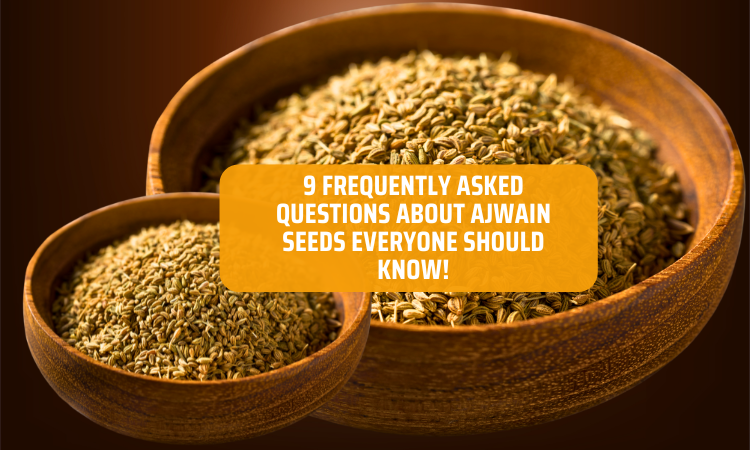
9 Frequently Asked Questions about Ajwain Seeds Everyone Should Know!
Share
Ajwain seeds are very small in size and appear similar to cumin seeds. But it has a completely different aroma and flavour. Also known as Carom Seeds in India, this small seed is a blend of nutrients, vitamins, minerals, and fibre.
It has similar medicinal properties to turmeric and it may prevent various ailments.
Ajwain has a long history of being used in Indian households as well as Ayurvedic medicines. But this generation may not know the full extent of Ajwain in all of its forms (oil, seeds, extracts).
In this blog, we will discuss 8 frequently asked questions about Ajwain that people have today.
Nutritional Value of Ajwain:
Though Ajwain is still not considered a Superfood, it has a variety of nutritional value. Check below.
- Vitamins: Niacin, Thiamine
- Minerals: Sodium, Phosphorus, Calcium
- Carbs
- Fiber
- Proteins
- Antioxidants
- Fragrant Thymol-rich essential oil.
FAQs about Ajwain Seeds:
1. Does Ajwain help in human consumption?
Yes! For hundreds of years, Indians have used Ajwain seeds for improved consumption. They effectively help reduce stomach pain and provide relief from gut issues.
2. Can we consume Ajwain seeds daily?
Consuming Ajwain seeds is generally safe. You can take it every morning. It can help you with stomach issues, indigestion, weight loss, etc. However, don’t consume it excessively as it may cause potential stomach issues.
3. Should we drink Ajwain water daily?
Yes. You can drink Ajwain water daily. This is completely safe. Moreover, it benefits your stomach issues and relieves pain, cramps, gas, and heartburn.
However, people with certain diseases should consult a doctor before consuming Ajwain.
4. What is the best time to drink Ajwain water?
There is no fixed time to drink Ajwain water. However, it is most effective when taken with an empty stomach. Drink Ajwain water early in the morning before you eat anything. This practice will provide you with optimal digestion and freshness.
5. Who can drink Ajwain water?
Ajwain water is generally safe for all. However, if you have any Ajwain allergies, you should avoid them. Not doing so may cause adverse reactions and illness.
6. How to make Ajwain tea?
Cooking Ajwain tea is no big deal! Here is the step-by-step process:
- Take water in a bowl.
- Put some Ajwain seeds.
- Now, boil the water for 8-10 minutes.
- Keep the flame over low to medium.
- Once simmered properly, remove it from heat and let it cool.
- Strain the mixture properly.
- Now, serve lukewarm.
7. What health problems can Ajwain help with?
Ajwain Seeds are helpful for the following health conditions-
- Digestive Health
- Respiratory Health
- Immunity
- Weight Loss
- Menstrual Pain Relief
- Arthritis Pain
- Skin issues such as Acne and Pimples.
- May reduce the risk of heart disease by lowering the pressure.
8. Is Ajwain helpful in reducing belly fat?
Ajwain does help with digestion. That’s a fact! But weight loss depends on several other factors as well. Weight loss is managing calories and replacing bad food with good.
Ajwain seeds help losing weight when you replace high-calorie soft drinks with Ajwain water and exercise daily.
Don’t Consume Ajwain Seeds If You:
Ajwain seeds are generally safe but should be avoided by the following people.
- Pregnant women.
- Individuals with Diverticulitis
- People having Liver Diseases.
- Patients with Peptic Ulcers.
- Individuals allergic to Ajwain.
- People on special medications.
For the best results, consult your doctor before consuming Ajwain.
Conclusion:
Ajwain has been a part of Indian households for hundreds of years. But people today don’t know much about it.
In this blog, we have discussed some of the most asked questions about Ajwain Seeds, the benefits of Ajwain, its nutritional value, and who should avoid it.
We hope this blog has helped you.
Are you looking for authentic Ajwain seeds for your home?
Try Manpasand Ajwain Seeds- the taste of real Ajwain.
